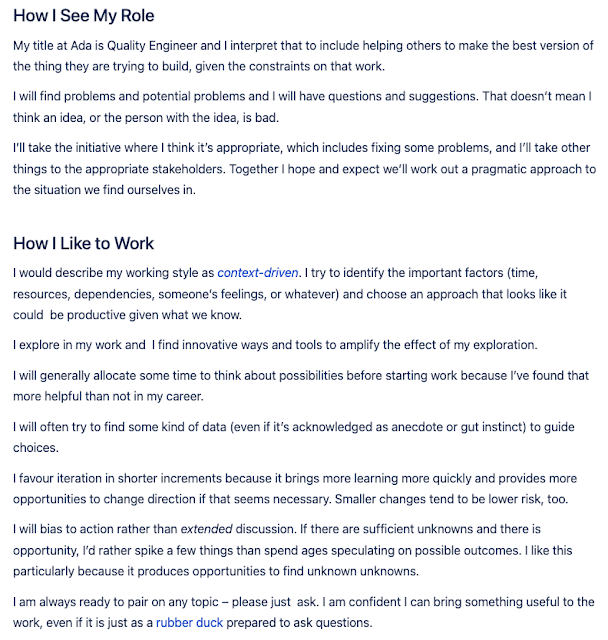This week at work my team attended a Myers Briggs Type Indicator workshop. Beforehand we each completed a questionnaire which assigned us a personality type based on our position on five behavioural preference axes. For what it's worth, this time I was labelled INFJ-A and roughly at the mid-point on every axis.
I am
sceptical about the value of such labels. In my less charitable moments, I imagine that the MBTI exercise gives us each a box and, later when work shows up, we try to force
the work into the box regardless of any compatiblity in size and shape.
On the other hand, I am not sceptical about the value of having conversations with those I work
with about how we each like to work or, if you prefer it, what shape our boxes are, how much they flex, and how eager we are to chop problems up so that they fit into our boxes.
Wondering how to stretch the workshop's conversational value into something ongoing I decided to
write a README for me and am encouraging others to do the same. Here's my
first draft, up now on the company's Confluence:
Unrelated, but contemporary with the workshop, I was listening to the
most recent episode of Oddly Influenced in which
Jessica Kerr describes the concept of agency as it is used in C. Thi
Nguyen's book,
Games: Agency as Art.
... you can say people are “high agency” if they feel free to take action to change stuff that they don't like. Low agency if they're like, ... "it is [what it is].” ... In Games: Agency as Art... the whole point is that when we play a game, we adopt a different agency than the one we naturally, inherently work toward.
As a person, I might want to be happy, and I want to have friends and stuff. That's a different layer of agency than: “I'm going to choose to ... get this ball in the goal.” ... we kind of become different people for the purposes of the game. We take on a different agency, where our goals become not our life goals, they become something entirely situational that we've chosen.
A big point of the book is that we can choose agencies at all. That as people, we don't just operate according to our personal values at all times, our values don't drive us in every action ... within each situation, we have our purposes ...
At work, we choose to adopt the agency of: what does my team need to accomplish? What does my company need to accomplish? And that isn't the same as our purpose as human beings.
Well, I say unrelated, but as I was listening to the show (twice, like normal) the idea of agency resonated with me.
The Myers-Briggs "box" is an agency inhibitor and in my view of the world I simply don't lug it around or sit inside it. Instead, I carry tools and, when work shows up, wonder
which tools to attack it with. This feels a lot like agency to me.
In fact, seeing a potential problem (the workshop benefit is limited to a point in time, the specific participants, and faith in MBTI) and thinking about possible solutions (such as a README), and then going away and trying one is a demonstration of what my README says and also speaks to the point Jessica makes about not needing to align directly with some company goal.
That is, there's no KPI, no ticket on a Jira board, and not even a hopeful hint from a manager that expects me to try to accomplish anything here. But I did it anyway because I hope it'll help us to work together better in future and I'll carry on doing things just like it for the same kinds of reasons.
You can take that as read.
Image: boris misevic

